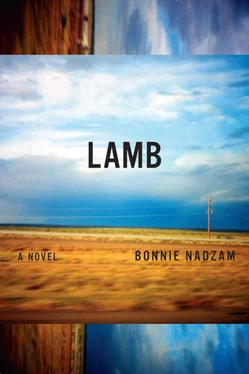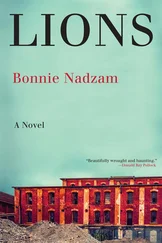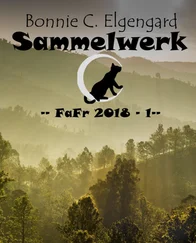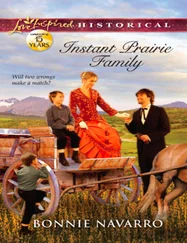Bonnie Nadzam - Lamb
Здесь есть возможность читать онлайн «Bonnie Nadzam - Lamb» весь текст электронной книги совершенно бесплатно (целиком полную версию без сокращений). В некоторых случаях можно слушать аудио, скачать через торрент в формате fb2 и присутствует краткое содержание. Город: New York, Год выпуска: 2011, ISBN: 2011, Издательство: Other Press, Жанр: Современная проза, на английском языке. Описание произведения, (предисловие) а так же отзывы посетителей доступны на портале библиотеки ЛибКат.
- Название:Lamb
- Автор:
- Издательство:Other Press
- Жанр:
- Год:2011
- Город:New York
- ISBN:978-1-59051-438-2
- Рейтинг книги:5 / 5. Голосов: 1
-
Избранное:Добавить в избранное
- Отзывы:
-
Ваша оценка:
- 100
- 1
- 2
- 3
- 4
- 5
Lamb: краткое содержание, описание и аннотация
Предлагаем к чтению аннотацию, описание, краткое содержание или предисловие (зависит от того, что написал сам автор книги «Lamb»). Если вы не нашли необходимую информацию о книге — напишите в комментариях, мы постараемся отыскать её.
Lamb — читать онлайн бесплатно полную книгу (весь текст) целиком
Ниже представлен текст книги, разбитый по страницам. Система сохранения места последней прочитанной страницы, позволяет с удобством читать онлайн бесплатно книгу «Lamb», без необходимости каждый раз заново искать на чём Вы остановились. Поставьте закладку, и сможете в любой момент перейти на страницу, на которой закончили чтение.
Интервал:
Закладка:
But every morning before his mother’s wreck, David’s littlest brother run outs behind him calling Davy, Davy wait. Davy wait. Crying out. Running, tripping, falling, every morning a fucking embarrassment. Broken tooth one day, scraped-up face the next day, blood and snot and crying all over the place yelling wait wait Davy. But he won’t ever catch up and won’t ever get a raisin biscuit or two dimes or know a thing about Superman. How could he? He’s Nel.
Ten years later and it seems everywhere in town is the smell of soft tar and petrol and the distant crash of breaking glass and screaming tires and Les Brown and Doris Day singing out the bedroom window of his skirt-chasing father.
Every day as a young man David wears a clean, starched button-down shirt. When he drives he keeps his hands at ten and two, and he’ll take the car straight across the fallow fields, off the road, a cold beer or two or three on the floor of the passenger seat. He is the only one his mother bought a car for, and now that she is gone he takes it wherever he wants. And why shouldn’t he? He’ll never get a dime from his father, no matter that Henry and Mark left them all to rot there, including Dad. No matter that Dad wouldn’t eat if it weren’t for David, wouldn’t have clean clothes, would probably be arrested because Nel never goes to school, instead he mopes and reads books alone and sleeps behind the Texaco. Won’t even sleep in the house anymore.
When she buys him the car it is almost new and now the chassis is already half eaten with rust from driving over creeks and down creeks and the rotors are warping, he can hear it.
Next thing, Nel disappears. One night like every night he goes to sleep behind the Texaco and in the morning he is gone. No one knows where he’s gone and no one is looking and no one cares. Wherever he goes that night, he disappears, fifteen years old, and no Lamb ever sees him or hears from again.
Cathy comes to David and pulls him out of the empty house and she sets him down at her own kitchen table with a beer and a pot roast sandwich and in all the world she has chosen him.
Someone’s hand between his shoulder blades. A pressed suit. A garden rake. A metal desk before him. Phones are ringing and he is looking for his little brother. Something bites every vertebra in his spine and forces his eyes down and fixes his gaze on what has suddenly become fat white concrete at his feet.
No voices. No birds. No Glenn or group of boys or even Nel. Asphalt rising up in a fixed plane in every direction. He’s in a parking lot. Chicago. In a Mercedes. With his father, now dead. And every stranger’s face is his own face: empty, haggard, sick of driving, sick of eating. And he will witness everything good and decent in this world humiliated and destroyed and that is just how it is. If anybody knows it, David Lamb knows it.
There is a small person inside of him wishing to tell Tommie all about it and then another person inside of him crushing the wishes like empty beer cans against a cinder-block wall. Lamb isn’t stupid. He knows how the story ends. He knows that he’ll keep his promise—it’s the only thing he gets to keep. He’ll return her to the parking lot after Linnie’s come and gone. Bring her right back to where he found her. And when she walks away and looks back in his direction in a year, or two years, or three years, if she looks back at all, she will hate him. But he will have saved her. He will seal her up in silver light and deliver her back to her mother. Back into the arms of her mother.
And he will sit there in his truck, both hands on the wheel, smiling with all of his teeth, watching her go. And the wind will be dirty in his hair, and there will be no decent place left in his heart because in all this chasing nothing he will have scrubbed it out, scrubbed it hollow, and nothing can fill it back up but words he makes as beautiful as he can. A sentence that will carry, he hopes, as if it were the wind, as if there were seeds of rush and blue-eyed grass upon it. As if the alphabet could reset his bones, or restart his life.
He ran his big hands up into her thin tangled hair, careful not to pull any knots. He kissed the top of her pale head again.
“You know exactly what it’s like to be me,” he said. “Don’t you? Don’t you see me?”
She nodded into his chest.
“That’s right. You do. You’re my twin. Your heart is hewn to mine. Isn’t it. Don’t you see?”
In the night she woke to the sound of his crying. It was big crying. His face ugly and pink with it and one hand on the top of her head and the other on her hip, his chest bare, wrinkled, and finely furred, faintly gray, and the skin beginning to loosen from the bone just beneath the arms and on his forearms and the backs of his hands. She turned to face him. I’ve hurt you, he was saying, I have I have. Am I ruining your life? Tell me I’m not ruining your life.
She touched the back of his head, his coarse hair, and he caught it in his own and pressed it to his mouth. That such kindness should be in this world, and he its recipient.
But she said nothing, and he had never been so sorry for anything in his life. By force of will he turned his gross crying into laughing. “Oh, I’m sorry. I’m sorry. Big ugly man crying. I must be scaring you.” Outside the window, he knew, behind the towels and drop cloth, Alison Foster stood shivering in a thin blue veil of falling snow. Taking notes.
“It’s okay,” the girl said. “I’m okay. See?”
He lifted his head and looked at her, looked at her from hairline to the dirty ends of her fingers. “You are, aren’t you? You’re perfectly whole.” He took her in his arms and held her, rushing his hands up and down her legs and arms and shoulders and head.
When she was asleep again, he went out after Foster. He circled the shop, the cabin. Brought his own Maglite to the ruined outbuildings and checked inside. Walked to the river and looked among the trees. Up the road with his light looking for footprints in the world’s thinnest gauze of snow. Up to the Fosters’ house again, as he had every night, and he saw the old woman breathing mechanically in her hospital bed in the orange lamplight, and he circled the house and looked in the window of the empty bedroom, and around to the back and into the room where Foster slept in the flashing blue TV light.
• • • • •In the morning the sky was bright as polished silver. Snow covered Lamb’s boots and piled up to his ankles. To the north the clouds ended, a bright blue line of daylight searing as if just beneath the cloud cover—a trick of distance.
He stooped in his boots at the end of the drive, near the fence, and checked around him. There was no one watching, was there? No one who could see and remember this or report any of it, and he vomited into the snow. When he stood he kicked snow over it and went out to the street.
He checked the snow for Foster’s footprints, but most of the snow had fallen after midnight. Alone in his heavy sheepskin jacket he shaved at the river, rinsed his mouth with the ice-cold water, then moved inside where he tidied the cabin and the shop, cleared it of her dirty socks, a hair rubberband, the little yellow sweater. He brought everything from the car that would not be his and stacked it all in the bunk room and stood and watched her sleeping. He returned to the cabin and brought out ratty towels and set them with the duct tape in the bunk room for extra window insulation.
“Are you packing?” The girl sat, cheeks flushed with sleep.
“No, dear. I’m just tidying up for the guests.”
“What guests?”
“Shouldn’t we have some? A dinner party around the fire?”
“You’re insane.”
“Ssh.” He sat on the edge of the bed and pulled a hat over her head. “I haven’t built a fire yet. It’s cold. You look beautiful all drowsy and with your faced mushed with sleep.”
Читать дальшеИнтервал:
Закладка:
Похожие книги на «Lamb»
Представляем Вашему вниманию похожие книги на «Lamb» списком для выбора. Мы отобрали схожую по названию и смыслу литературу в надежде предоставить читателям больше вариантов отыскать новые, интересные, ещё непрочитанные произведения.
Обсуждение, отзывы о книге «Lamb» и просто собственные мнения читателей. Оставьте ваши комментарии, напишите, что Вы думаете о произведении, его смысле или главных героях. Укажите что конкретно понравилось, а что нет, и почему Вы так считаете.












